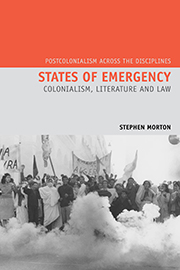6 - The Palestinian Tradition of the Oppressed and the Colonial Genealogy of Israel's State of Exception
from Part III
Summary
It was in part the colonial state of emergency in British Mandatory Palestine that provided a legal and political framework for the formation of the state of Israel and its legislative order. For the Emergency Defence Regulations, as Said explains in a passing reference to the uses of British colonial law in Israel-Palestine, ‘were originally devised and implemented in Palestine by the British to be used against the Jews and Arabs’ during the mandate period, and especially during the Arab revolt of 1936–39. But after 1948, Israel retained the emergency regulations ‘for use in controlling the Arab minority’, and ‘forbade Arabs the right of movement, the right of purchase of land [and] the right of settlement’. In this context, the declaration of a state of emergency was used as the legal pretext for a large-scale land grab: ‘the Emergency Defense Regulations were used to expropriate thousands of acres of Arab lands, either by declaring Arab property to be in a security zone or by ruling lands to be absentee property’. The contradiction between Jewish opposition to the emergency regulations during the British mandate period on the grounds that the regulations were colonial and racist, and Israel's subsequent adoption of these regulations after 1948 may seem to be self-evident. Yet what this contradiction also points to is a broader tension within the discourse of Zionism between a movement of national liberation from British rule and European anti-Semitism on the one hand, and a movement of settler-colonialism on the other.
- Type
- Chapter
- Information
- States of EmergencyColonialism, Literature and Law, pp. 173 - 208Publisher: Liverpool University PressPrint publication year: 2013



